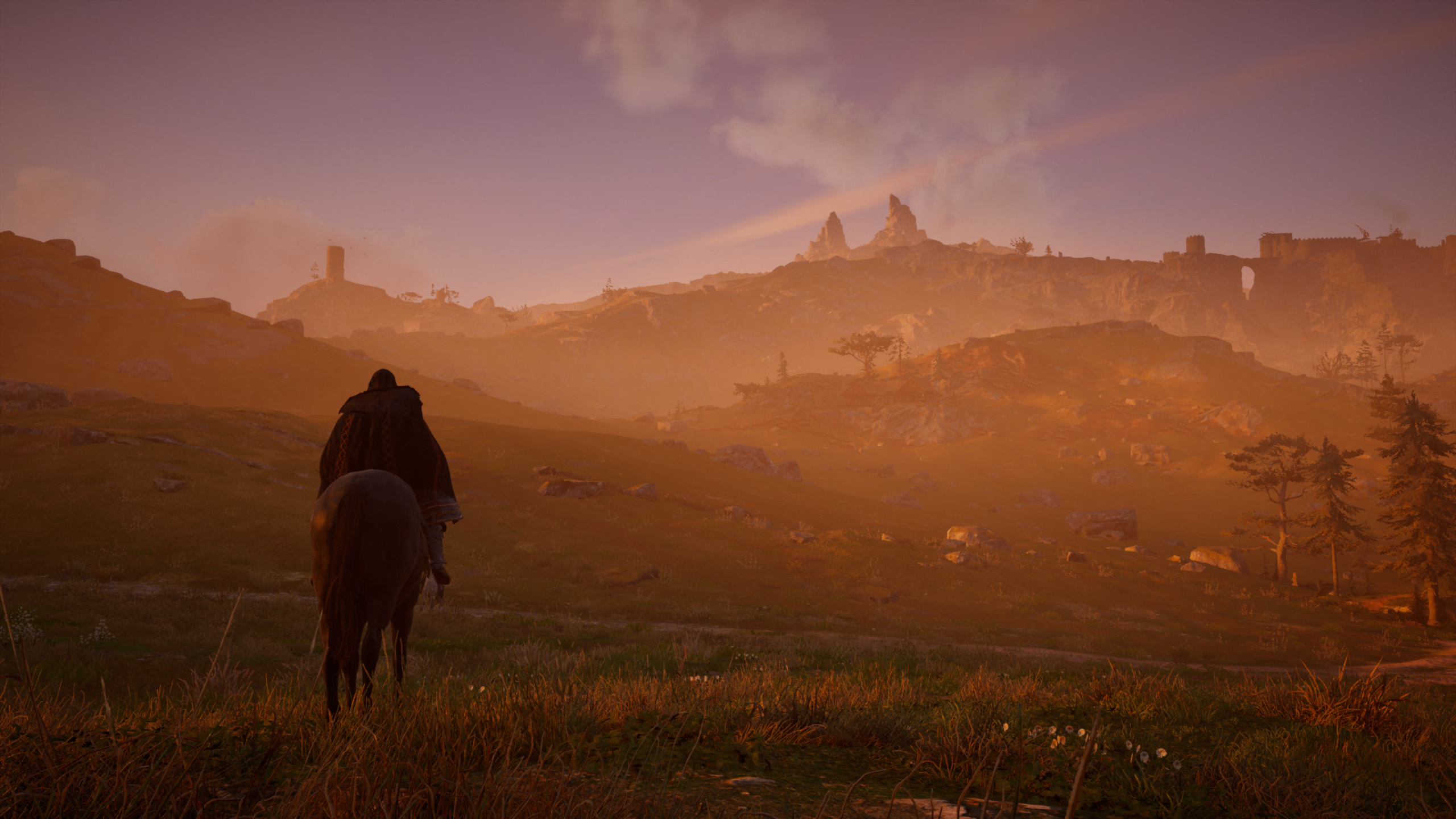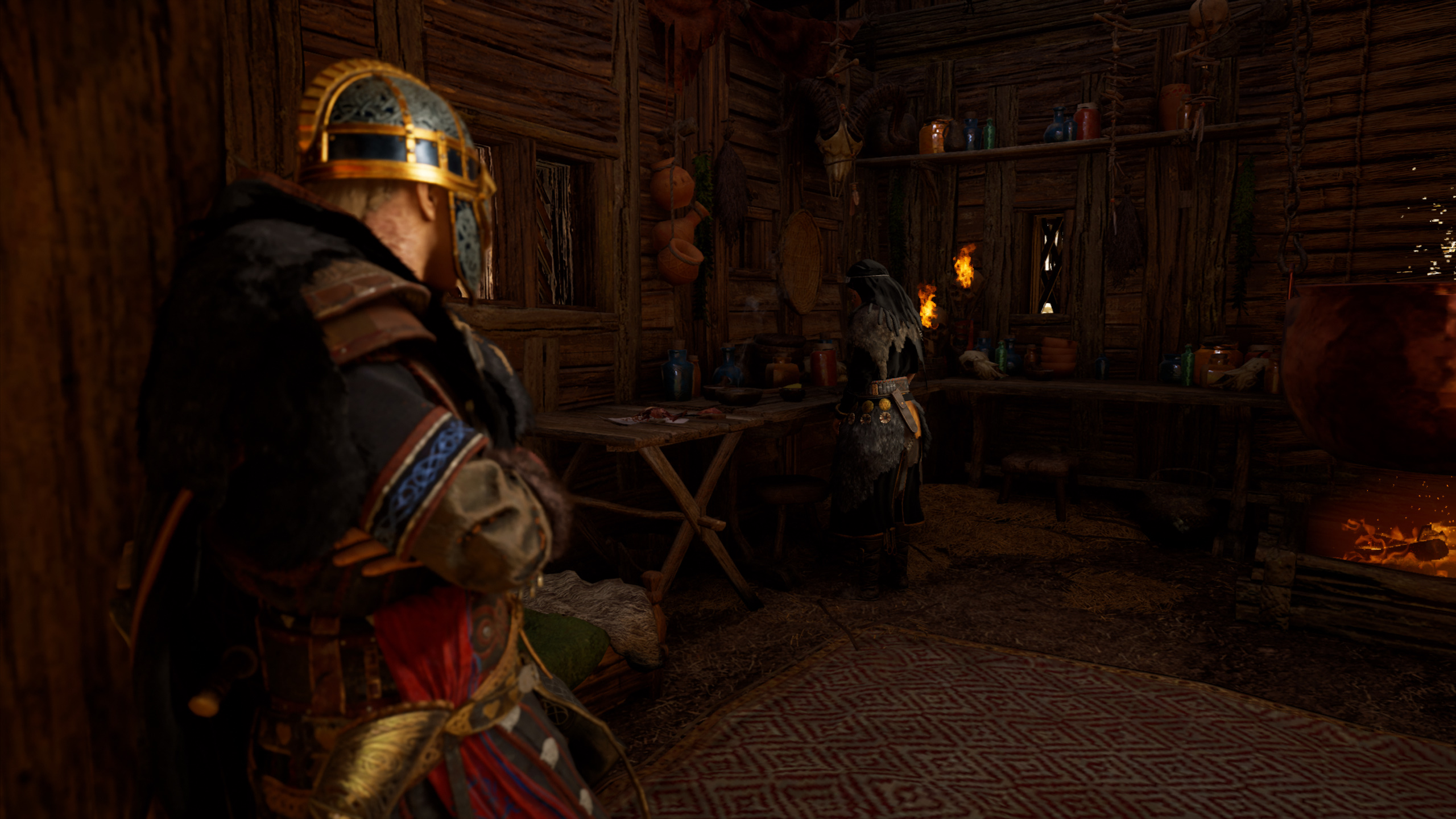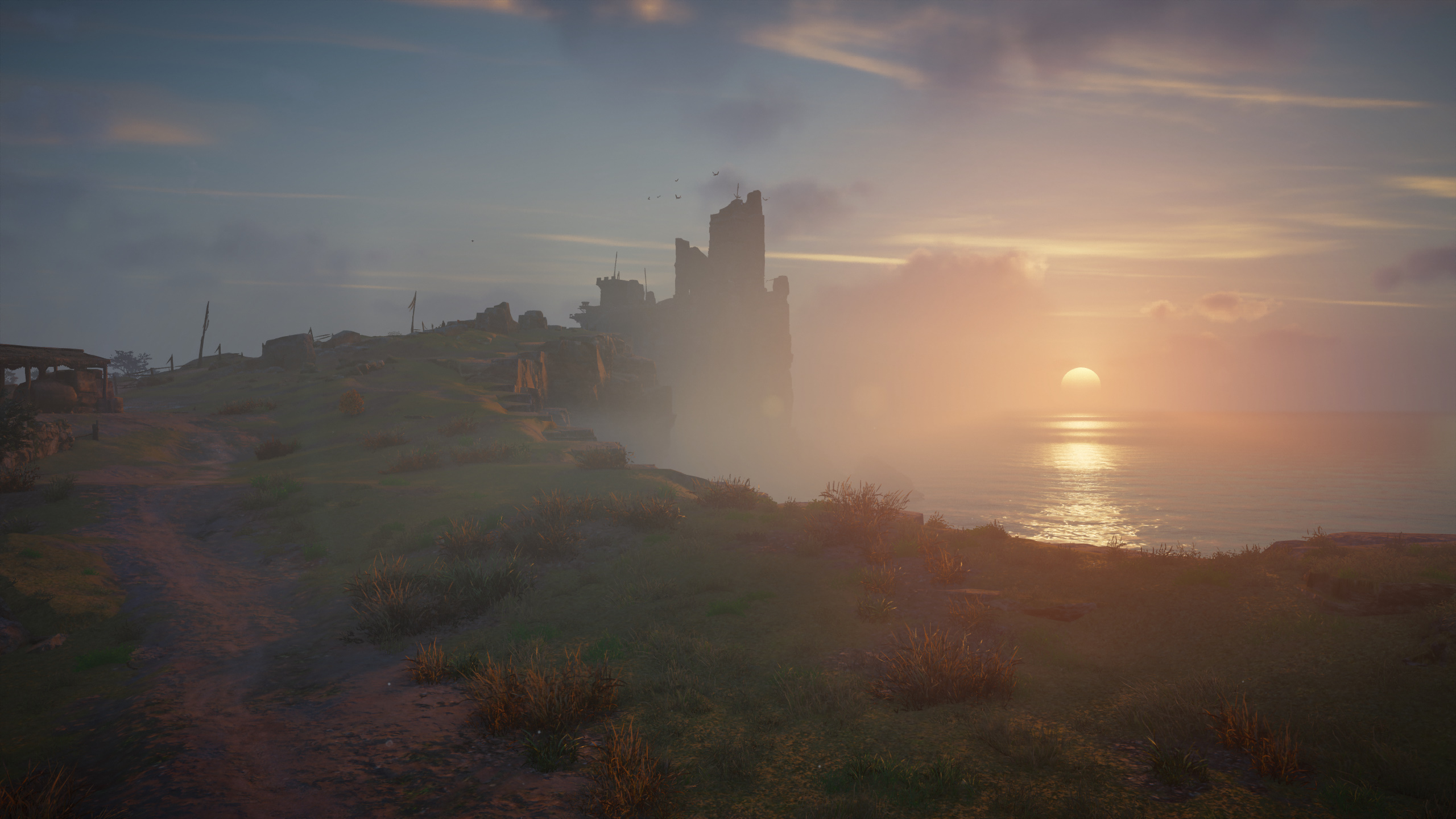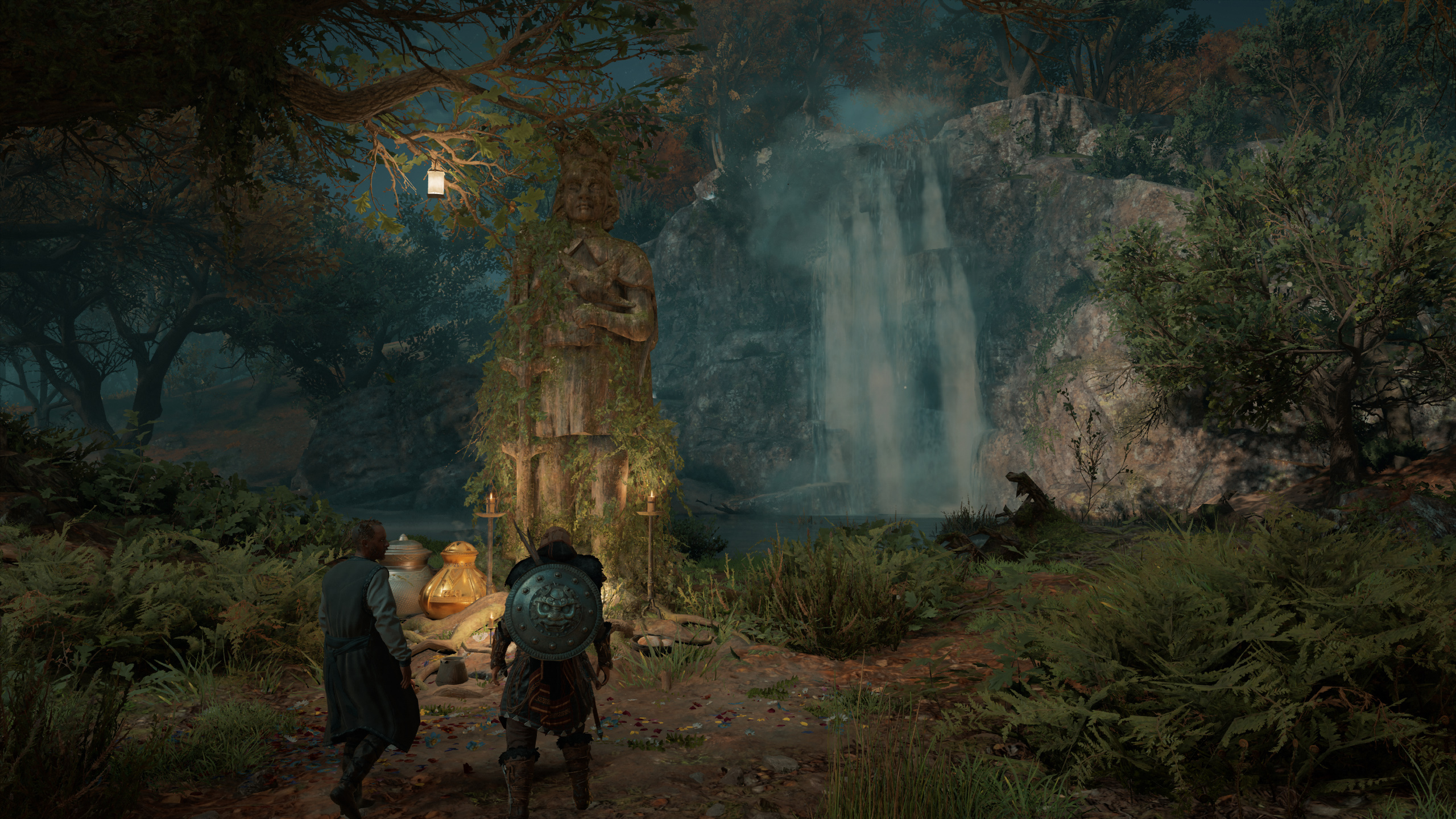Our Verdict
Bloody and captivating, Valhalla is Assassin's Creed at its best.
PC Gamer's got your back
What is it? An enormous Viking RPG
Expect to pay $60
Developer Ubisoft
Publisher:Ubisoft
Reviewed on i7 8700, RTX 2070, 16GB RAM
Multiplayer? No
Out November 10
Link assassinscreed.com
Assassin's Creed Valhalla is my favorite Assassin's Creed, which is saying something considering it's a series that spans 23 games. It builds on the already excellent RPG foundations laid by Origins and Odyssey, but with meaningful improvements that iron out many of the frustrations I had with both games. Case in point: Not once during the 60-hour story was I told to stop and level up a bunch before I could take on the next quest. That also means Ubisoft isn't selling optional experience boosts, either. Thank god.
What really stands out to me, though, is how much better Valhalla is at telling an engaging story that twists and turns according to my decisions. In Odyssey, my choices sometimes felt arbitrary or confusing, but Valhalla does a great job of introducing characters, concepts, and themes, and then forcing me to decide how Eivor, the main character, relates to them. When one of my beloved own clansmen betrayed me and tried to take my life, I had no choice but to kill them in self defense. But I agonized for almost a full minute over whether to let them grasp their axe with their dying breath or kick it away, denying them entrance into Valhalla. I had come to love this character and their betrayal was upsetting, but does that justify denying them an eternity in heaven?
Ragnarökin'
What really impresses me, though, is how consistently great the story is throughout the entire adventure.
Set during the Viking Invasion of England, the story follows Eivor and her adoptive brother Sigurd, two fierce Norse warriors chasing glory. Like Odyssey, Eivor can be played as either a man or a woman, but what's great is you can now switch between them freely to test which one suits you instead of being locked into that choice from the outset. Whichever Eivor you play as, the story unfolds in mostly the same way. Sigurd was supposed to be made a local king, but the unification of Norway under King Harald leaves him two choices: Bend the knee or leave. Unwilling to give up his dream of ruling, Sigurd convinces Eivor and much of his clan to abandon Norway and sail to England so they can violently carve out a new future.
The anchor of this story is my settlement, called Ravensthorpe, which expands slowly over time as I gather new resources and construct new buildings. Like Dutch's camp in Red Dead Redemption 2, the settlement is my home base that I return to frequently in between quests. New buildings unlock new upgrades, like a forge so I can enhance my equipment or a brewery so I can host feasts that give me a temporary buff to my stats. As the settlement expands, it draws new characters, sidequests, and even the opportunity for romance. When huntress Petra asked me to help her look for her missing brother, for example, we ended up accidentally tripping on some magic mushrooms we found and chasing forest creatures instead. Like any good trip, we bonded and became lovers a few dates later.
Even though many of the characters aren't as fully realized and vivid as in Red Dead Redemption 2, I love how Valhalla's settlement encourages me to get to know my clan. Instead of completing side quests for random strangers I find while exploring, like in Odyssey, I'm helping my blacksmith find a wife, or my museum curator settle a feud. Each one is a narrative thread that, woven together, tells the collective story of the Raven clan.
Most of the story is concerned with what's happening outside the borders of my settlement, however. In order to cement a permanent place in England, Eivor and Sigurd have to negotiate alliances with the various Viking tribes (and the occasional Saxon king). This is all centered around an Alliance Map, where I choose which region I want to venture to, participating in a somewhat self-enclosed series of quests to win the favor of whichever faction happens to be there.
At first this structure seemed too templated and isolated, but once the story gets going characters from one region will pop up in the story of another, giving a nice sense of continuity between these otherwise independent chapters. What really impresses me, though, is how consistently great the story is throughout the entire adventure, even as it takes astounding detours to places far beyond England and Norway. That's something I can't really say for any other Assassin's Creed games, including Odyssey.
It takes a while before it all starts to come together, but Ubisoft does a great job juxtaposing my relationships with Sigurd and the rest of the Raven clan with the much more epic sagas as I wage war on Picts with the legendary Halfdan Ragnarsson, establish puppet kings with Ivar the Boneless, or trade veiled threats with Aelfred, King of Wessex. All the while, dialogue choices poke and prod the rigidity of Norse culture and traditions with surprising nuance. It's hard to explain without spoiling specific moments, but Valhalla has some wickedly knotted moral conundrums. There were a dozen or more times I stared at dialogue choices, completely stumped over which option was right.
Blood and glory
There are still some moments where Valhalla feels like a bad Game of Thrones episode, though. Entire armies show up undetected at a moment's notice, and characters will inexplicably change sides in a conflict just to reveal they're actually a part of the Templar order—the overarching villains of the Assassin's Creed mythos.
These cutscenes are relatively few and far between, and ultimately this is a game about two warring cults reliving historical simulations to uncover mythological artifacts in the modern day—a bit of cheese is expected. But, and I can't believe I'm about to say this, Valhalla even makes Assassin's Creed's sloppy overarching meta-narrative interesting again. Without spoiling anything, the final two hours are a whirlwind of revelations with implications that stretch all the way back to the first game. God help me, I actually want to see what happens next.




Raiding feels like a shallow feature clumsily stitched onto the rest of the game.
I love that the Norwegian invaders are portrayed as so much more than vicious barbarians, but it also ignores more troubling aspects of that era of history completely. It feels like a wayward extension of Ubisoft's feeble reluctance to admit its games have political messages.
Take raiding, for example. To gather resources to expand my settlement, I have to pillage Christian monasteries dotted along the various riverways of England's different kingdoms. The first few times I did this, it was exhilarating: My soldiers stormed the town, hurling torches onto thatched-roof cottages, slaughtering the guards, breaking windows, shattering pots and crates, and helping me kick down doors to get at more valuable loot. But god help you if you kill an unarmed clergyman, even by accident. Kill too many and it's game over. Burning their entire lives to the ground, however, is totally OK.
I'm not saying Valhalla should gleefully reward you for butchering Christians, but including a hard rule against it feels like Ubisoft intervening just to wag a finger in my face. It's even stranger when I start a quest with a Saxon lord who completely ignores the fact that I pillaged every church in his lands on the way to meet him. It makes raiding feel like a shallow feature clumsily stitched onto the rest of the game rather than something incorporated into and accounted for by the story. Ubisoft could've invented a narrative reason why Eivor doesn't kill innocents or just made priests really good at dodging thrown axes when they're fleeing for the hills. Instead I'm given a warning message that completely pulls me out of the moment.
I have a similar problem with Valhalla's Assaults—the big set piece castle sieges that typically act as the climax of a given regional questline. I'd never expect Ubisoft to go to the pains of simulating a full battle from start to finish, but the illusion of participating in one is paper thin. I'll use a battering ram to smash down the castle gate only to find my own soldiers are inexplicably already inside the castle and locked in never-ending mock combat with enemy soldiers. There's no sense of a battle having an ebb and flow, and so long as I complete my objectives the fight will progress in my favor.
Axe, meet skull
Both of these issues would be a lot more frustrating if combat weren't so much fun. The system is similar to Odyssey's in a lot of ways, but much more satisfying. For example, I can now dual-wield any two weapons, changing my combat style while also giving me access to special moves unique to my offhand weapon. Playing on a harder difficulty, I immediately favored the traditional axe and shield for the extra defense. But then I unlocked an ability on Valhalla's skill tree that let me dual-wield two-handed weapons. What a game changer.
Instead of sporting a measly axe, I'm holding a two-handed battle axe in one hand and a massive spear in the other—or I can hold two spears and be extra stabby, or two shields and be extra shieldy. It's so much fun discovering all of these combinations. And no matter what weapons I choose, I know I'm going to be both horrified and amazed at just how artfully Eivor can use them to separate people from their limbs.
It's hard to overstate just how gnarly some of the finishing movies are. I've repeatedly knocked enemies down and then impaled them on their own spears, or chopped their hands off as they raised them to defend against the axe I was about to lodge in their skull. There's even one where Eivor sticks an axe in a guy's face and then punches his head off. It's exactly what you'd hope for in a game about Vikings.
Of course, stealth is still an option, but it's quickly becoming the most antiquated part of Assassin's Creed—if only because so little of it has changed. Valhalla brings back some cool features like being able to blend into crowds to avoid guards and creating distractions to draw them away, but I'm often frustrated by how shitty the AI continues to be. Guards are dumb, and you can easily lure them into bushes one after another to assassinate them, and when one does spot you it feels like every guard within five miles immediately knows where you are. These are the same problems I've had in every Assassin's Creed, sure, but they're still annoying. At least Valhalla is more willing to let me forgo stealth entirely in all but a few quests. Being a sneaky Viking doesn't feel appropriate, anyway.
On my i7 8700 and RTX 2070, I'm getting 60-70 fps using 1440p and high settings. There's occasional dips, but overall I'm impressed with Valhalla's performance. It's absolutely gorgeous, too.
Like most Ubisoft games, though, this might not be your experience. Other members at PC Gamer had to really mess with options for a long time just to get stable performance, and Valhalla demands a beefy system if you hope to get remotely good framerates. Even with top-tier hardware, expect to spend some time messing with the different options and a few hiccups. If your CPU or GPU are a few generations old, you'll have to make some compromises.
The combat isn't all just flash, though. There are 23 different human enemy types that each have their own distinct weapons and combat styles, which makes fights feel dynamic and often quite challenging. It's more varied than any other Assassin's Creed. Rogues will kick dirt in your eyes to blind you, while Ceorl's will swap weapons with dead allies, 'Berserkirs' will pelt you with thrown axes while they run you down. Knowing the attack patterns and timing of these enemies takes patience and skill.
Fortunately, Eivor has more tools than just the weapons she wields. While exploring, special books can be found that unlock new abilities, like being able to set your weapon on fire or a harpoon you can use to yank enemies off cliffs. This, coupled with a skill tree that recalls Path of Exile—hundreds of nodes that offer incremental stat boosts mixed with bigger ability unlocks—makes customizing Eivor really fun.
This all feeds back into the open world exploration, which remains largely untouched from Odyssey saved for a few improvements. The map is still littered with icons in typical Ubisoft fashion, but you can (and should) turn that all off in the options so that you can explore without signposts everywhere. Most of the stuff you'll find is new equipment and treasure you can take back home or use for upgrades, but I also found hidden caves with challenging puzzles, secret boss battles, and weird little one-off quests that are often bizarre and sometimes hilarious. One time I happened upon a Viking who didn't realize he had an axe lodged in his skull. He asked me what he should do so I offered to remove it, and he died instantly. That was it. Quest completed, I guess?
Valhalla succeeds on so many levels that it's easy to forgive the times when it doesn't.
These activities all reward you with skill points you can spend in the skill tree. But, like I said earlier, Valhalla doesn't use this as a way to gate your progress through the story. Different regions still have power levels you have to match if you hope to survive the enemies there, so you can't go anywhere you want right away. But aside from doing a little exploring, I mostly blitzed through the story without ever feeling forced to go off and do something else to level up.
These little improvements go a long way in making Valhalla more inviting and fun than Odyssey. Assassin's Creed's transformation into a full-blown RPG hasn't been the cleanest one, especially as features like stealth feel left to stagnate while other aspects get so much better. But Valhalla succeeds on so many levels that it's easy to forgive the times when it doesn't. It's an enormous game, and it'll probably take me another 20 hours to finish everything I still haven't completed. I honestly can't wait.
- AC Valhalla guide: 6 top tips
- AC Valhalla romance: Find love in Dark Ages Britain
- AC Valhalla armor: The best you can find
Bloody and captivating, Valhalla is Assassin's Creed at its best.
With over 7 years of experience with in-depth feature reporting, Steven's mission is to chronicle the fascinating ways that games intersect our lives. Whether it's colossal in-game wars in an MMO, or long-haul truckers who turn to games to protect them from the loneliness of the open road, Steven tries to unearth PC gaming's greatest untold stories. His love of PC gaming started extremely early. Without money to spend, he spent an entire day watching the progress bar on a 25mb download of the Heroes of Might and Magic 2 demo that he then played for at least a hundred hours. It was a good demo.



